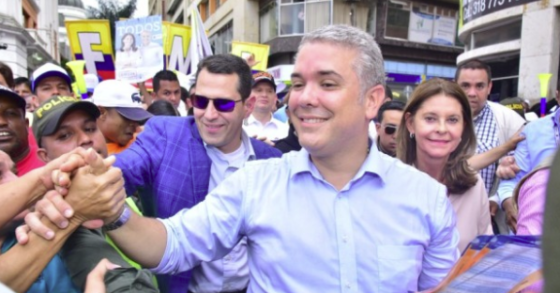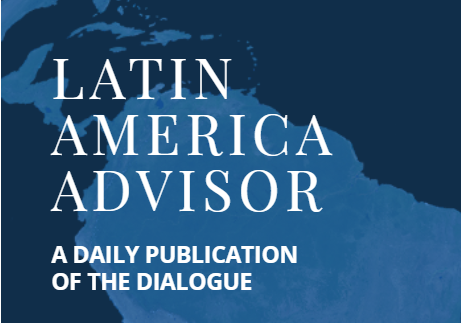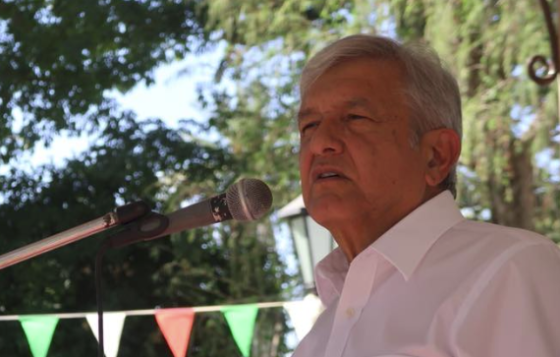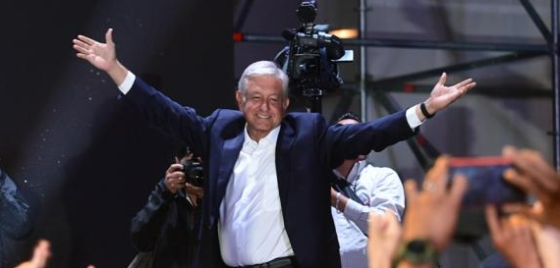
Will Colombia’s New President Deliver on His Promises?
Iván Duque, a conservative former senator, on Sunday won Colombia’s presidential runoff election. What does it mean for the country?
A Daily Publication of The Dialogue
I am pleased to share this selection of editions that the Latin America Advisor's team felt covered especially important developments this year.
Led by editor Gene Kuleta, our reporters, Leticia Chacon, Mark Kennedy and Lara Kovandova, produced more than 250 editions of the daily Advisor over the past 12 tumultuous months, as well as editions of the weekly Energy Advisor and biweekly Financial Services Advisor.
Meanwhile, our readership has expanded to include many of the world’s most innovative companies, such as Apple, BMW, BlackRock, BP, Citigroup, Merck, Mitsubishi, Pearson, Roche and Walmart, as well as the libraries at Berkeley, Dartmouth, Duke, Georgetown, Harvard and Notre Dame, among other leading universities, and government ministries on four continents.
We wish all of our readers happy holidays, as well as health and peace in the new year.
— Erik Brand, Publisher
The Organization for Economic Cooperation and Development said Nov. 22 that the world economy will grow 3.1 percent this year and 2.2 percent next year, and that a global recession will likely be avoided. At the same time, the OECD lowered its growth outlooks for Latin American countries, including Brazil, Mexico and Argentina. What level of economic growth can Latin America and the Caribbean expect in 2023? Which countries will see the highest levels of growth, and which will lag behind?
Peru’s Congress voted overwhelmingly to oust President Pedro Castillo, who had already been facing impeachment, after he attempted to dissolve Congress and take unilateral control of the government. Vice President Dina Boluarte was sworn in as Peru’s first female president, and Castillo ended the tumultuous day under arrest. What are the biggest challenges now facing Boluarte, Peru’s sixth president in less than five years? What long-term reforms does Peru need in order to stabilize its government, and will Boluarte and the country’s Congress be able to put them into place? What has Peru’s chaotic political situation meant for the country’s economy and businesses?
In the weeks after Brazilian President Jair Bolsonaro lost his bid for re-election on Oct. 30, his supporters have blocked roads and camped outside military buildings in Mato Grosso state and elsewhere around the country. Bolsonaro has attempted to challenge the result in a move that the electoral authority’s president said appeared to be an effort to instigate protests. How likely are pro-Bolsonaro protests to disrupt Brazil’s economy and the transfer of power to President-elect Luiz Inácio Lula da Silva?
What factors are most shaping the global trade outlook, and how does Latin America and the Caribbean fit into the picture? Will congestion and delays, which spiked during the Covid-19 pandemic, persist into the new year? Is the region benefiting from near-shoring efforts? How has intra-regional trade changed since the pandemic, and will those trends continue into next year?
Major tax reforms proposed by the government of leftist President Gabriel Boric will be debated in Chile’s Congress in the weeks ahead. Some industry groups have criticized aspects of the tax reform measures as unfair and likely to have unintended consequences, such as deterring investment and stifling economic activity. What are the main attributes and shortcomings of the proposed Chilean tax reforms? How likely are they to pass Congress in their current form, and what changes can be expected?
Brazil’s candidate to lead the Inter-American Development Bank (IDB), Ilan Goldfajn, won election in the first round of voting. A former central governor and currently the head of the Western Hemisphere Department at the International Monetary Fund, Goldfajn had strong backing from the United States, which holds the most votes in the institution and is its largest financial contributor. What factors contributed to Goldfajn’s victory, and what attributes does he bring to the job? How might Goldfajn, 56, reshape the multilateral lender, and what should he prioritize for his five-year term? What will be his biggest challenges when he takes office next month?
The 27th annual United Nations Climate Change Conference, or COP27, was held in Egypt on Nov. 6-18. The world’s largest climate event with more than 190 participating countries, it brought together heads of state, ministers, civil society, and private sector representatives to discuss mitigation efforts and adaptation to climate change. What are the biggest takeaways from COP27 for Latin America and the Caribbean? What new climate mitigation innovations and financing mechanisms have the most promise for helping nations in the Western Hemisphere that are struggling with climate change? How much of a voice was Latin American and Caribbean nations given in leading the international negotiations?
A leftist and former guerrilla, Petro assumed the country’s presidency championing social justice with pledges to implement a “total” peace and end oil exploration in a bid to promote Colombia’s green energy transition. However, the government has already lowered revenue estimates for its flagship tax reform and is considering reversing its proposed ban on new oil contracts to secure fiscal stability. How well has Petro led the country over the past 100 days, and what have been his main accomplishments so far? What factors have constrained the implementation of his political agenda? What are the main challenges ahead?
Venezuelan President Nicolás Maduro faced a toughening of sanctions and rhetoric in recent years, particularly as rightwing governments were in power in Colombia, the United States and Brazil. But leftist governments are now in control in Bogotá and Washington, and soon will be in Brasília. Among the signs of closer ties, Gustavo Petro on Nov. 1 became the first Colombian president to meet with Maduro in six years. What do the changing political dynamics in the Western Hemisphere mean for Maduro, and what factors will be most consequential? How likely are other leftist governments in the hemisphere to be able to encourage Maduro to take steps toward democracy? What incentives would Maduro have for such steps?
Clashes between protesters and police on Oct. 18 marked the third anniversary of widespread demonstrations in Chile. The deadly protests in 2019 against the country’s deep inequality demanded improvements in health, education and pensions, as well as more housing. Amid continued unrest and a rejected new constitution, how far has Chile come in addressing the demands of 2019? How successful has the new leftist president, Gabriel Boric, been in fostering dialogue and change? What kind of reforms does Chile need in order to keep violent social unrest from flaring up again?
U.S. Secretary of State Antony Blinken visited South America Oct. 3-7 to meet with the recently elected leftist presidents of Colombia, Chile and Peru. The trip sought to strengthen ties and find common ground on a host of issues including regional security and migration. What did Blinken set out to accomplish on the trip, and how successful was he? What more should the United States be doing with its foreign policy agenda in the hemisphere? What determined the selection of the three countries?
The World Economic Forum last month announced a new initiative to improve socioeconomic conditions in Central America through support for the implementation of environmental, social and corporate governance, or ESG, principles. The organization is partnering with local business organizations in Guatemala, El Salvador and Honduras on the initiative. How important are ESG metrics for companies in Central America, and how well are companies in the region implementing them? How much of an impact have such policies already had on people in Central America, and what promise do they hold for the future? How accurate are the metrics by which companies’ ESG policies and achievements are evaluated?
U.S. Secretary of State Antony Blinken led a delegation to Mexico City on Sept. 12 for an annual meeting of the U.S.-Mexico High-Level Economic Dialogue (HLED). The U.S. delegation focused its agenda on two recently enacted U.S. laws: the $280 billion Chips and Science Act, which fosters semiconductor manufacturing, and the Inflation Reduction Act, which the administration hopes will advance cooperation in the renewable energy sector in Mexico. Meanwhile, Mexican officials focused on security ties. What were the most important advances to come out of the recent talks, and what new avenues of cooperation will they lead to between the United States and Mexico? What is the state of U.S.-Mexico economic relations, and what are the biggest problems in the trade relationship that need to be worked out?
On Nov. 15, Jamaican Prime Minister Andrew Holness declared a state of public emergency in parts of the country to quell rising criminal activity linked to gang violence. A state of emergency endows authorities with greater power, including the ability to carry out arrests without warrants. What is at the root of gang violence in Jamaica? How effective will a state of emergency be, and what other measures may be needed to tackle the issue? Does criminal activity threaten the island’s business environment, such as crimping investments and tourism?
Brazilian President-elect Luiz Inácio Lula da Silva, who takes office on Jan. 1, has signaled that he wants to overhaul state oil company Petrobras. Last month, he began interviewing candidates to run the company, Reuters reported. What are the most significant changes Petrobras could see under Lula? What revisions might be in store for Petrobras’ fuel-pricing strategy and investments in areas such as renewable energy? Who are the most likely candidates to become the company’s next CEO, and how likely is Petrobras to act independently of political pressure and interference, a problem that arose often in the previous administration?
Chile, Colombia and Brazil have made strides in developing national policies promoting a hydrogen economy, and clean hydrogen is gaining ground elsewhere across Latin America, delegates from the region said at the U.N.’s COP27 conference in Egypt this week. Is the emerging form of energy sustainable and economically viable for the region? What explains some countries’ rapid adoption of the burgeoning green industry? How can Latin America and the Caribbean capitalize on hydrogen’s potential?
Ethanol is supporting economic and environmental challenges including improving air quality and reducing greenhouse gas emissions, according to trade association Growth Energy. However, critics of ethanol say that non-food sources of ethanol consume valuable land that could be used to produce food or left in a more natural state. How desirable is ethanol as a source of fuel as the world transitions to greater use of renewables, and how can ethanol producers minimize their environmental footprint? How has ethanol trade between Latin America and the United States evolved since the pandemic’s disruption to trade flows and supply chains? How are the biggest regulatory and trade policy debates over ethanol shaping up for the years ahead?
Chilean President Gabriel Boric on Nov. 2 unveiled his long-planned proposed reform of the country’s pension system. If lawmakers approve it, the reform would do away with the country’s existing private pension managers, known as AFPs, and would also require employers to pay an additional 6 percent of their workers’ wages to a publicly run social security system. How likely is the reform to win congressional approval, and what changes might lawmakers make to it? What are the most significant problems in Chile’s existing pension system, and to what extent would Boric’s reforms solve them? What are the biggest changes that current and future retirees would experience if the reforms win approval?
Voters in the United States head to the polls next Tuesday for the country’s midterm elections. The entire House of Representatives is up for election as is more than a third of the Senate, 39 state and territorial governor’s offices and numerous other local offices. What is at stake in the midterm elections for Latin America and the Caribbean, and for U.S. relations with the region? How much of an influence will Latino voters in the United States have on the balloting, and which side of the political spectrum is winning their support? What are the most important races to watch from a Latin American perspective?
Luiz Inácio Lula da Silva defeated incumbent President Jair Bolsonaro in Sunday’s runoff election to return to Brazil’s presidency, which Lula previously held from 2003 to 2010. The victory, by a margin of fewer than two percentage points, capped a stunning political comeback for Lula, who was imprisoned for 580 days in 2018 and 2019 after being convicted of corruption and money laundering. To what can Lula attribute his victory, and what will be the most significant changes he will make as president? How likely are Bolsonaro—and his supporters—to accept defeat? How well will Lula be able to work with Brazil’s Congress, where Bolsonaro’s supporters increased their representation in this year’s legislative vote? In what ways will Bolsonaro continue to influence Brazilian politics?
Rodrigo Chaves, an economist and former finance minister, defeated former President José María Figueres in Sunday’s presidential runoff election in Costa Rica. Chaves, who ran as an anti-establishment maverick, has criticized Costa Rica’s traditional political parties and has vowed to bypass the Legislative Assembly by holding public referendums. To what can Chaves attribute his victory, and what will be the main challenges he faces after he takes office May 8? What are Chaves’ main policy objectives, and will he succeed in getting them implemented? What does the 57 percent voter turnout, low by Costa Rican standards, say about Chaves’ popularity and mandate to govern?
 The Latin America Advisor features Q&A from leaders in politics, economics, and finance every business day. It is available to members of the Dialogue’s Corporate Program and others by subscription.
The Latin America Advisor features Q&A from leaders in politics, economics, and finance every business day. It is available to members of the Dialogue’s Corporate Program and others by subscription.
Iván Duque, a conservative former senator, on Sunday won Colombia’s presidential runoff election. What does it mean for the country?
Mexicans go to the polls on Sunday, July 1, for the country’s presidential, legislative and local elections. What can we expect?
Leftist Andrés Manuel López Obrador swept to victory Sunday in Mexico. What changes are in store?


